Sticktight fleas
I was outside one day and noticed sticktight fleas on my chickens. Growing up with cats and dogs, a flea, in general, was nothing new. I had see a dog flea and a cat flea, but these were different.
Sticktight fleas, or Echidnophaga gallinacea, are a species of fleas that burrow underneath the chickens’ skin and are not easily removable. But I’m going to tell you exactly what I did, step by step, how to get rid of fleas on chickens. Sticktight fleas can control your happiness and your flocks. It’s better to act quickly if you suspect your chickens have fleas.
Table of contents
What are sticktight fleas and how do you get rid of them?
After an extensive amount of research, I learned that hell on Earth can come in the form of sticktight fleas.
Although Frontline does kill sticktight fleas on cats and dogs (always contact a veterinarian, though), you can’t take that approach with your chickens.
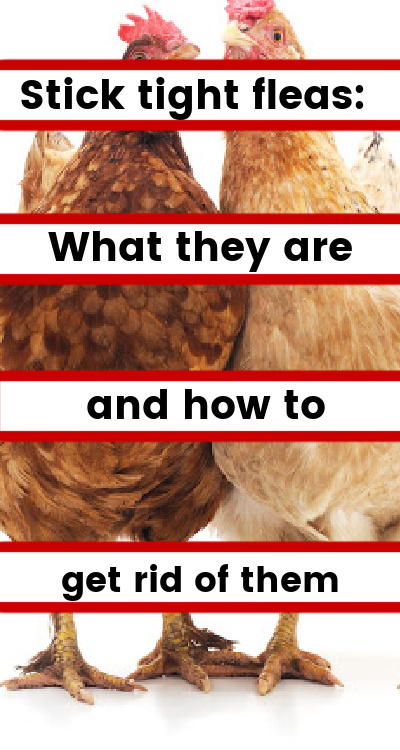
What are sticktight fleas?
In short, a stick-tight flea also referred to as poultry fleas, chicken fleas, stickfast flea or stick fleas, is a flea that burrows like a tick would. Gross, right?
Since they’re a bit smaller than your average flea, they are a pain to remove, and, as your stereotypical flea does, they multiply rapidly.
Additionally, sticktight fleas are usually found attached in clusters. They’ll attach mainly to the comb wattles on the head of poultry but can also be found under wings and around the vent area.
Although their alter-name is the poultry flea, they will attach to any host they can find. Outside cat + sticktight flea = sticktight fleas on cats’ ears.
That means that sticktight fleas on humans are possible! You, me, the cat – it doesn’t matter. As long as you have blood to suck and bare skin, a sticktight flea has a place to be. Double gross.
Are sticktight fleas dangerous?
The short answer is yes, they can be detrimental to your flock. Before I knew what they were, I actually had a rabbit die from being infested by stick-tight fleas.
The fleas suck blood as a tick does and will wear an animal down, preventing it from hunting or moving. My poor livestock were ultimately dying from blood loss.
If sticktight fleas go unnoticed, or worse, untreated you could very quickly have an uncontrollable problem and be forced to cull your whole flock. Having caged-bird systems can escalate the problems since chickens won’t be able to dust bath/
Another thing to note is when an animal is the main host for hundreds of sticktight fleas, the animal becomes susceptible to other diseases from loss of blood and a crippled immune system.
How do you get sticktight fleas?
They’re carried by a host animal as any flea is. This host can be a squirrel or even the neighbor’s dog if he/she isn’t treated for fleas. When we moved onto our homestead, we inherited some hens from the previous owner.
Soon I realized we also inherited a rodent problem, which presented its own obstacles (including new hosts for stickfast fleas). Since the rodents eventually moved in with abundance, the fleas did too, creating flea-infested environments in no time right in my backyard poultry systems. Thankfully, I do not believe there is any reason to worry about something as serious as the bubonic plague, but adult sticktight fleas on young birds is scary enough for me.
In my particular case, I had to not only get my sticktight flea infestation under control but also a rodent problem at the same time, which I did successfully do.
Do chickens eat fleas?
The jury is still out on whether chickens eat fleas or not. In my experience, they do not seem to eat fleas. Fleas are very small and move quickly with their powerful jumping legs.
I believe they’d eat them if they had the opportunity, but I would not suggest that you plan for chickens to be your flea control. I’ve heard guineas will eat fleas, but if you have an infestation it might not be enough.
How to get rid of fleas on chickens
Sticktight fleas were the most aggravating thing to research. I wanted to know how to get rid of chicken fleas, once and for all!
I never found a chicken fleas treatment online that was organic, which made this all a very hard thing to deal with.
We try not to use pesticides or chemicals on our land, and this was the first time I had to look into what would be appropriate and safe enough to use within the living quarters. I read each product label of anything I considered using so as to not introduce lethal chemicals to my flock.
I’m here to tell you what I found through my research and, even better, how I’ve defeated the stick-tight fleas with this chicken treatment. I use this method year after year without fail.
Some years are more intense than others, so plan accordingly.
To begin, you need to determine which chicken flea treatment to use and determine if you have an infestation or not.
- Note that if you’re sure you have an infestation, my method might not be enough for your situation.
- If you see fleas on your birds, usually on the head, comb wattles, and under the eyes or vent area you need to take action as soon as possible. Anywhere on the skin of chickens, really.
- Look at your birds. Are more than two or three chickens completely covered in the little bug(gers)? Yes? You might have an infestation.
Sticktight fleas removal methods I read about
The majority of the methods I found were coming from individuals who didn’t have many birds, maybe 5-10, and they were extremely hands-on.
I recommend you to use these methods if you believe you have an infestation that can not be handled with my method.
Treating the bird:
Catch your bird. Easiest done in the evenings while they’re roosting. Smear vaseline (petroleum jelly) over the areas infested with sticktight fleas, being very careful not to get the vaseline in their eyes. This will smother and kill the fleas.
Dust your bird very carefully with food-grade diatomaceous earth, making sure you aren’t creating a large dust storm as it can harm a chicken’s lungs.
Folks have asked me if diatomaceous earth will kill sticktight fleas and my answer is no. I use DE to help the chickens dust bathe the dead fleas off, not to kill the actual fleas.
Once they’ve burrowed into the skin, DE isn’t going to help very much.
After you’ve left the chickens for the night, come back and wipe off the vaseline and pull the stick fleas off.
REPEAT until your chickens are clear.
Treating the living quarters:
This is required in all methods. It was not enjoyable in any way.
- Shovel out any and all bedding, nesting materials, etc. If you have a dirt floor, like me, this is going to be a big job. You need to shovel out the whole top layer of your floor. If you have a solid floor (wood, concrete, etc.) I envy you. Just shovel out whatever is atop that floor material and spray the floor down well.
- BURN THIS BEDDING! Or haul it far away and put it in a HOT compost pile. High heat from the a compost pile can kill the sticktight fleas and the bedding is a great organic material.
- Add all new bedding and nesting material along with a healthy layer of DE.
- Choose a flea spray of your choice and treat the coop, while the chickens are away. Spray as often as needed until your flea problem is gone. I absolutely love Vet’s Best spray because it’s essential oil-based and safer than others I’ve found.
I use this spray in my home, around my rabbit hutches, and on my dogs’ beds! If you’re wondering how to remove sticktight fleas from your dog, this spray is a good first step outside of flea medication! Read my honest review of Vet’s Best Spray and why I love it!
Other methods I read about
Most of the methods I read about involved applying actual flea and tick medication to the neck of your birds, as you would do with a cat or dog. I deemed it a last resort.
If you have an infestation, you may have to do this. I read about some folks having to cull their whole flock because the stick-tight fleas were so bad.
The most important thing is to decrease egg production in fleas. Understand the life cycle, kill female fleas so that you slow down the production of a new generation of immature fleas. Without decreasing or eliminating egg production, you’ll continue to have a thriving flea population. Be sure to go after adult fleas and their eggs.
If you do choose to go the route of applying medication, be sure to do your research on doses and brands. You’ll likely need to discard of your eggs for 2-4 weeks or longer when using that form of sticktight fleas chicken treatment.
Applying chemicals directly to your bird means it’s soaking into their system; that chemical can also make it to those beautiful fresh eggs, unfortunately.
There are also methods where people bathe their chickens in a type of chemical dip. This, too, was not something I was willing to do unless an infestation occurred. My chickens would also hate me forever…it would’ve been a sight to see though, me trying to bathe my chickens!
I suggest you go to backyardchickens.com and search their site. I found the most personal experience stories there!
My sticktight fleas treatment method (that worked)
First, I followed the steps above to thoroughly clean out my chicken coop and dispose properly of the bedding so the little devils didn’t come hopping back.
You HAVE to do this. Yes, it’s no fun and the fleas are hopping all over you just mad that you’re disturbing them.
Put your work pants on, slide on your rain boots, spray yourself with diluted tea tree oil (or even Vet’s Best like I do!) and get to it! No excuses, Y’all.
Next, I bought Sevin Yard Spray and Vet’s Best Flea and Tick Yard and Kennel Spray. I want to acknowledge that ‘Sevin’ products were recently said to not be safe for chickens.
After doing research, I felt this was the safest option in comparison to other options I found. I would’ve liked to battle these fleas naturally, but it just wasn’t an option.
The chickens were never in direct contact with the spray and it’s diluted as you hook it directly to a hose to apply.
While your chickens are out of the chicken coop, spray the new bedding/flooring with Sevin Yard Spray. Do this every day for two weeks, changing their nesting bedding often.
You can just scrape it to the floor and treat it. DO NOT SPRAY YOUR BOXES WITH SEVIN SPRAY. I feel I would’ve been a bad chicken mama had I sprayed their boxes. Please don’t make your ladies sit in Sevin Spray.
Every evening as I picked up eggs and the chickens were roosting I sprinkled DE on the floor of the coop. I also lightly, and carefully, sprinkled the hens and roos if they’d let me.
I’d also sprinkle the nesting boxes while they weren’t being used.
On your second week of spraying the Sevin Spray on the floor, add the Vet’s Best Flea and Tick Yard and Kennel Spray into your routine. The Vet’s Best Flea and Tick Spray is one of the best products I’ve found and a total blessing to my everyday life.
It’s essential oil-based (chicken-safe), fights against fleas, ticks, and mosquitoes, and it’s even safe to spray in your home! (You’ll want to get the home spray, though).
I apply Vet’s Best to my dogs’ beds, my carpet, and my couch! BONUS: It smells wonderful in the house AND chicken coop!
After following the bedding and spraying steps, and sprinkling DE like it’s your job, you should notice a drastic decline or a total cease in stick-tight flea activity.
If your flea activity has decreased, repeat these steps. If you repeat these steps and the activity is still high you might have an infestation and will need to take further measures.
How to treat the yard for fleas with chickens
Once you tackle the first situation of getting rid of the chicken flea, you’ll want to take precautionary measures moving forward so they don’t go back.
That means treating the yard, your dogs and cats, etc. Visit a veterinarian and let them know your poultry flea situation. You can also spray Vet’s Best Flea & Tick Spray in your home and out in the yard.
I spray my home in the summer every 14 days even though my dogs and cat are on flea medication. Starting with their dog beds, the carpet and lightly misting the couch I spray once a month or as needed when flea activity increases.
Keep an eye out for fleas and act accordingly, seeking professional help if needed. I am not medically trained as a doctor, veterinarian, etc. This article is about a personal experience I had and is not meant to treat or diagnose your specific issue.
Products mentioned in this article that I love
No more sticktight fleas!
95% of my chickens are sticktight flea free! The ones that do still have fleas on them are the broody hens that haven’t dust bathed the dead fleas off.
Everything you’ll read will say that you absolutely have to pluck each flea off of backyard flocks. I promise there are easier ways to get rid of fleas on chickens.
In my experience, this isn’t completely accurate. My flock has access to a large grazing area and Florida has some really gritty sand. Since they sand bathed, I never picked a single flea of my ladies, although I would if I had to.
I still apply the Vet’s Best spray once a week to every 14 days as a preventative because it’s safe and smells wonderful. In addition, my cat and dogs are treated for fleas and ticks to cut down on the number of host options the fleas have.
If one or two fleas catch a ride on me into the house I know they’ll soon be done for. If you have any questions for me, comment below! And remember, sticktight fleas are not the same as your regular, typical flea.

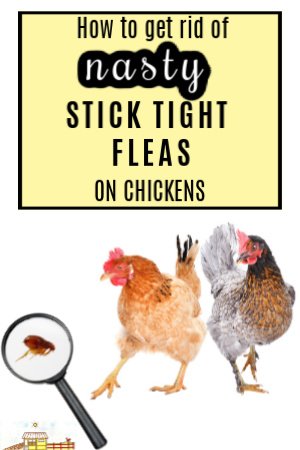
Related to chickens:
- How to raise meat chickens for beginners
- How to raise chicks for beginners
- An honest review of Vet’s Best Flea and Tick Spray
- Brooder heat plates vs heat lamps

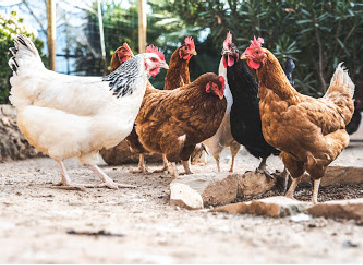


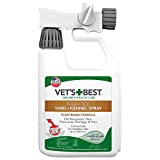

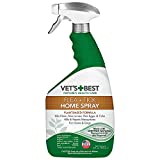
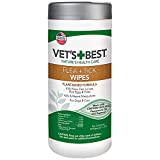
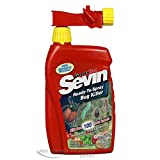


Thanks for lots of good information and ideas of safe products to combat the stick flea issue. I live along the central coast in Calif and in 40 years with a small backyard flock (7 currently), have never encountered this nasty flea. My cat now has them. I have applied Bag Balm and done DT dustings on them and Vet’s Best spraying on surfaces in the henhouse and see small progress but I agree that once you have them it’s critical to do a major cleaning of the entire area, while treating the hens/roosters and other pets that may contact them. I’m curious how Stick Fleas do their egg life cycle. I hate to imagine wild birds and other wild creatures as carriers who suffer with no way to survive these infestations…. signaling an outbreak that I hope gets attention.
Thankyou for your website and no-nonsense approach and advice. 😉
How long does it take for the fleas to die/fall off from the Vaseline? I applied a decent amount to my silkie rooster’s wattles the other day, and they have yet to fall off. I tried scraping them off with my fingernail, but they’re still stuck on there. I can’t tell if they’re dead or not.
Hi Hannah, I’ve never personally used the vaseline trick. I’m sorry I can’t provide more insight! I would give it a week’s time and see what they feel like them. Good luck to you!
Hi, my Pekin Ducks have fleas on them. Can I use the same sprays and powders that you mention for chickens on my ducks?
Hi Adriana! I never applied sprays or powders directly on my chickens. I have read that some people do/have, but I never felt comfortable with that. The sprays/powders I utilized in their hen house was also exposed to my ducks and I never had an issue. Please note, though, that I am not a medical expert and can not give official medical advice – I’m only speaking from my personal experiences. My best advice, though, would be to not directly apply chemical sprays/powders to your ducks but treat the ground around them in small doses according to the product’s recommendation. Good luck to you!
Hello! I live in Florida and am having a terrible time with stick tight fleas on my hens. Am i able to dab Vet’s Best Flea and Tick home spray directly on the fleas with a cotton swab? I find it very difficult to remove them with tweezers. The hens don’t stay very still while I try to pluck them off. I’m afraid of hurting them.
Hi Maria! I’ve never applied Vet’s Best Flea and Tick home spray directly to my chickens so I can’t give you an answer to that. IF you do try that method, do it slowly and cautiously. I’m not a vet so I can’t give you medical advice. I’m so sorry you’re having this issue. Good luck!
Hello
I am so glad I found this. We have been battling these critters for some time now here in south Texas. We have sand where we live. We used hay in the old coop and they didn’t calm down until we got rid of the hay. We only had like 30 hens so it was easier to treat. We no have 170 hens and 6 roosters. We didn’t have the fleas for a while during the winter and the nasty snow weather we had. then once the warmer weather came they started back up. We started using ash in their coop last year and that helps.. we have to keep it clean weakly. I am trying to figure out how to use your protocol with so many chickens. I have heard the Adams spray under their wings.. but lets be realistic 176 hens and roosters lol. I am a little concerned about the sevin stuff. Was thinking to try the Vet’s best from the start and then the ash and DE. we have about 600 sq. ft. of run and coop and about a 3000 sq. ft. of yard for them. My kids today put cocoanut oil on their combs etc and it has worked for us and we also would spray the coop with dawn spray. But we want to get more chickens but not until this is under control. Any help would be appreciative. I am ordering the products recommended. We have 2 inside dogs as well.
Hi Daphne! I’m so sorry you are dealing with fleas like this. I have not used the Adams spray directly on the chicken so I can’t give any useful advice there. An ash/diatomaceous mix is always a great thing to provide to your flock. I would say definitely treat the dogs. If you have room to separate the chickens into smaller flocks temporarily, that could help. You could try using the Sevin OUTSIDE of the area they frequent so you’re not directly exposing them. Spray the Vets Best when they leave their main living area in the morning. Be sure to stay on top of treatments. I’m not a veterinarian so I can only give my opinion on past experiences of my own. If you have any broody hens that are particularly worse than others, remove them and quarantine them. Good luck!
Thanks for this.i have been battling sticktite fleas since last June. I have FINALLY gotten them under control. Unfortunately we had to resort to chemical treatment for a few mo th and it was very expensive but helped me tremendously. We have a 16×20 pole barn with a dirt floor and an enclosed 10×20 run. I was treating all 11 with revolution for dogs topical flea for 4 months. Spraying the floor at night with Premethrin10 and using vaseline on their comb. We were still finding clusters on their faces. I recently read about using Adam’s flea spray for the yard, and then apply the spray with qtip to the fleas on the comb. It’s worked amazing!!!!!!! My girls used to free range but haven’t in a year because of these gross insects. Hopefully withing the month they will be free again!!!
The Adam’s yard is different than the spray for their face. Also, I live in Central Florida so it’s always flea conditions lol
Hi Amiah! I’m so glad you enjoyed my post. Sticktight fleas are no fun and I’m so sorry you’ve been dealing with them in such an intense way. YOu’re absolutely right – it’s always prime conditions for fleas in Florida! I’m heard of the Adam’s spray and actually planned for it to be my second choice if the Sevin and Vet’s Best didn’t work out. My dogs are treated with Nexgard and have never had problems with fleas. My cat is on revolution and allergic to fleas so I have to stay on top of her dosage. I find that the Vet’s Best has been the best, natural product and it actually kills the fleas (I’ve tested it in mason jars). I also spray the Vet’s Best around the perimeter of my rabbit hutches. It’s a staple in my toolbox now. Thanks for letting me know what worked for you! If I ever use your method in the future, I thank you kindly in advance! Good luck with the fleas and let me know if you ever try to Vet’s Best and what you think. Stay healthy! – Chelsea
i’m in the far south west corner of western australia (margaret river). i use ash from my wood fire to rid these little critters. it put it all over their bodies but i also pluck out the fleas and use a bit of ash whilst doing this. had the worst infestation on my darling Cuba, the chinese silky rooster. it took a couple of weeks of hard yakka but eventually all the critters left the choox. i don’t think the critters were living in the chilton hotel but came originally from outside where they jump out of bed at night. we don’t really have a coup as they are free range. it’s the first time in 20 years i’ve had fleas on the choox and, actually, didn’t even know what they were when i first saw them; hence, the infestation that took place thereafter. so try the ash. it is much safer than DE and i’ve never seen any stress in my choox from using it around them, in their bedding or on the floor for a dust bath.
I am very familiar with stick tite fleas!
If you have them on your animals use cedar oil.
On your animals then your yard is infested!
The easiest way to rid your yard is to heavy water every night which drowns the eggs!- state if texas info- works like a charm!
That is AWESOME! I love that there is more than one way to do it. Good to know about the cedar oil – I’ll definitely try that in the future. Thanks for the pro-tips, Anne!
Cedar oil will kill a cat
Like Jan, I have them burrowing under my skin as well. I haven’t had a good nights sleep in 8 months. My arms and legs are mangled by these critters. I went to a dermatologist, even brought him a small bag of fleas and he laughed at me. Said fleas don’t burrow under the skin. I don’t know who to turn to or how to treat them……..
Hi Connie! I’m so sorry to hear that. Unfortunately, I am not medically trained in any way so I can’t provide you any information on how to proceed with your battle. If you can, just keep visiting doctors until someone listens. I can imagine how frustrating that is. I’m so sorry you’re experiencing that! Good luck to you.
This is the first day I am ever hearing about stick fleas. I noticed red little bugs on one of my dogs ears this morning.. I sprayed the bugs with cedar oil and then I immediately checked my other 3 dogs. At first I didn’t see any signs of them on my others. So I ended up giving the dog I could see them on, a bath. They are still all there… Sprayed her again with cedar oil and peppermint … Then I checked again a few more times on all the girls and found just a few on them. I have sprayed their ears with cedar oil…. peppermint, and just put DE all over them. Going to be giving them all a bath including the one I just gave a bath. Hoping they fall off in the bath, but I’m seeing they burrow in skin…. Am I going to have to take tweezers to my dogs ears?! Drs/Vets, would be my last resort but it sounds like they don’t want to even acknowledge this bug so that would be a waste of time and money! I just want them to go away because reading all these comments are scary! If there is anymore advice out there I will take it! Someone had suggested apple cider vinegar.. That might be something I try on them later. Maybe getting a cup of it and putting their ear in the cup to submerge the bugs???? I don’t know what else to do! Sorry for the ramble! I’m just really worried these bugs might harm my dogs 🙁 Anymore advice?! I have read this whole article and the comments.
Hi Durchi! I totally understand your concern, especially after reading the comments of someone whose situation is much worse than yours currently. First, I want to remind you that I’m not a veterinarian so I can’t give you official medical advice. By saying that, this is what I would do if I was in your current position. First, the stick-tight fleas I have seen are not red, but that doesn’t mean that they can’t be red. Be sure to be careful when spraying your pets with any type of oil, as animals can be very sensitive to certain oils. Always dilute any mixture, also, just to be safe – the same with apple cider vinegar. I would not suggest submerging your dog’s ear in liquid, just because you don’t want to get liquid INTO their ear canal (I imagine that could cause problems). The Vet’s Best spray I mentioned in my article is safe to use in houses and on pet bedding, carpet, etc. That spray is essential oil-based, using peppermint and clove. I would suggest mixing some peppermint and clove with a carrier oil and rubbing it on top of the bugs, instead of spraying them. After you rub the bugs with a topical oil, if they really are burrowed under the skin, I would say yes, take tweezers and very carefully remove the bugs. You want to make sure to get the head out. Once they’re dead, getting the head out should be easier. If you use ACV, dilute it with water as it is VERY strong and can sting your pup. I would suggest to either purchase some of the Vet’s Best spray or mix your own with peppermint, clove, and a carrier oil and spray your pups bedding and anywhere they might lay. Keep an eye on them to see if there are any more bugs. I hope this helps! Keep me updated! Good luck, Durchi.
I’m in central Arizona. We had a lot of rain last winter and spring so there are a lot of bugs this summer especially stick tight fleas. I have a litter of 4 week old kittens that were born outside are now inside with me and have these fleas on their faces and ears. Too many to pluck off with tweezers and I tried the Dawn dish soap bath already that didn’t kill all of them. I will try the Neosporin and the Vasoline in their ear folds to see if that works to smother them. Not sure about the saline and baking soda solution though but I may get to the point where I will try it if it means getting rid of these pests. So far I haven’t been bitten. ..yet. fingers crossed ☺
I would try the Vet’s Best spray in the house! I would not put it directly on the kittens but just around. That way if fleas jump off or eggs drop they die when they come in contact with the spray. I’m not a veterinarian so I can’t give you professional, medical advice but this is just what I would try personally. I am so sorry to hear that you’re going through this! I hope it gets better, Sharee!
Stick fleas on my body
I read about the Vaseline, and used neosporin instead, my daughter found a kitten he had them around his eyes and ears. I took a q-tip and rubbed it on them all and they dropped off his face and ears overnight. Plus the neosporin helps as an antibiotic too. Worked great!
My dilemma is I have 4 week old kittens that have these nasty stick tight fleas around their faces and ears terribly. I’ve tried the Dawn dish soap bath..didn’t kill all of them. Too many to sit and pluck with tweezers. I’ll try the Neosporin ointment next. I want to stay as natural as possible but whatever it takes to get rid of these pests, I’m gonna do!
sticktight fleas are alive and well in San Diego. I live on the water aboard a boat. I think sea Birds carry them. My dog had them last year, nothing would kill them except giving her a pill called Bravecto prescribed by the vet. This year I am the prey. They bite my scalp, I pour straight alcohol onto my head 5-0r more times per day, wash hair with pet shampoo daily and pull their bodies painfully from my scalp. I get ahead and another batch hatches. Pulling my hair out in San Diego. My scalp is painful. I have fogged my boat 3 times, used De, vinegar, salt ( that hurts) even rubbed my hair with bug spray. Also used olive oil and Vaseline. My dog is bug free!
Wow! I’m so sorry to hear that, MJ. I’ve never heard of a human having such a rough time with it. I might seek professional medical advice if I were in your position. I hope you find some relief soon!
My daughter brought home a kitten infested with sticktight fleas I thought they were ear mites took ear Mite medicine in a Q-tip and cleaned his ears he of course got very sick and had to be taken to the vet was treated and got better I did not know anything or had never heard of a stick-tight flea in my life they invested my face and my scalp as well this happened back in March and I am still battling them in my home and on my dog I have used many pesticides and Natural Things Vaseline triple antibiotic ointment lice shampoo seems to work the best and diatomaceous earth rubbing alcohol and many painful tweezer sessions it’s been hard for me to even get anyone to address the situation I’ve been hospitalized twice with infections from their bodies still being under my skin no doctor wants to even acknowledge that they exist I am now seeking help from a dermatologist and will let you know how it goes from there
Oh wow, Ruth! I am SO SORRY to hear all of that! I’ve never heard of a case of stick-fleas so bad on a human before. I am not a medical professional or a veterinarian so all of my advice is just that – advice and suggestions of what I might try if I was in your position. If you know what is attached to your body are in fact stick fleas, I would try to soak in a bath of some sort, maybe with some clove or peppermint essential oils or something. Or maybe make a face spray or ointment to rub on the fleas so they detach. I hope you find good help soon! You’ll be in my thoughts! Hope you and MJ get this figured out soon and find some relief.
Diatomaceous earth rubbing alcohol Dawn dish soap and salt water be very careful if you have very low blood pressure or are anemic doctors don’t seem to address it but dismiss it often
Boy what a great way to inform us of your knowledge of Stick Fleas. I am currently at vets with my rabbit. I have had him six months, for over nine months I have been itching, I have gone to doc four times😌, they refuse to listen, and to examine me under a scope. I have bugs on me attached like a tick. These are no tick!!! I showed the vet a pic he stated it is a stick flea
I do not have chicks or birds, my neighbor does, but I never visit over there. I have pics of different bugs on me, pulled off of me bleeding, and in my bed, and everywhere else you can have a bug go to hide. Sounds like bed bugs behavior, but most of the pics are not looking like any B.B. I’ve seen. These things must b ditgitally ehanced to be seen. If u look at my body under a scope you see bleeding sores, herendous most terrible thing I’ve ever expriencef in almost 60 years of living. I too, do not use toxic things, being a naturalist gardener. Do you have any suggestions…infectious disease doc, exterminator??? I have many many pics, of many diff things plauguing me, if you don’t have time to respond, perhaps some of your readers will know something I can do!!! Gracious thank you.
Hi Jan! I want to first start by saying I’m so sorry you’re experiencing this! Second, I would like to put on record that I am not in any way medically trained and I am not certified to give medical advice. With that being said, my “go-to” with any type on myself with any of bites is usually tea tree oil as far as a safe, topical ointment to put on bug bites. This is not medical advice, just what I personally do. Dogs and cats can both carry stick-tight fleas but I believe it is rare that they invade your home without having a host to latch onto. I have no experience with bed bugs, but it seems that maybe you have a slightly larger problem on your hands than stick-tight fleas. I would almost vote exterminator if the situation is so bad. Using poison stinks, but if the problem gets out of hand it can sometimes be the only option. Good luck to you and I hope a licensed medical professional can help you out!
Replying to Jan: please read this medical article: https://www.mdedge.com/cutis/article/141844/infectious-diseases/whats-eating-you-sticktight-flea-revisited
Just as a point of knowledge. For humans.. Try treating twice weekly with a solution of baking soda mixed with water. Be generous on scalp etc. Let sit for minimum of hour (or longer). Wash thoroughly. Followed with a rinse of salt (aquarium seawater). The Little critters are sensitive to the salinity.
Good luck. Doctors don’t seem to know what to do. This may not cure, but will help control. Vacuuming is your best friend.
Thanks for the tip!
Thanks for the info never heard of stick flea before. Been around or had chickens all my adult life, will check them from now own.
Hi Oscar! If you live in a state where it gets quite cold during the winters, you might not ever have to worry about stick-tight fleas! I live in West Central Florida and it gets quite hot here so the fleas have the opportunity to hatch like wildflowers. I hope you never have to deal with them. Thanks for stopping by and sharing your thought, Oscar. Hope to see you back!
Great Post! Thanks for sharing with us at the To Grandma’s house we go link party!
Thank you, Tarah! I love participating at To Grandma’ House We Go! If you don’t already, we’d love to have you contribute every week to the Simple Homestead Blog Hop! Thursday – Sunday!
Good to know! I’ve never heard of stick tight fleas before. But we do keep a variety of poultry. Do you know if they are only a southern pest or are they widespread?Thanks for sharing!
Most all of my research leads me to believe it isn’t a problem in the north, especially areas that snow/freeze. Down here in Florida, it rarely gets cold enough to “kill off” pests such as stick-tight fleas so once the warmer weather rolls around, I have to keep an eye out!